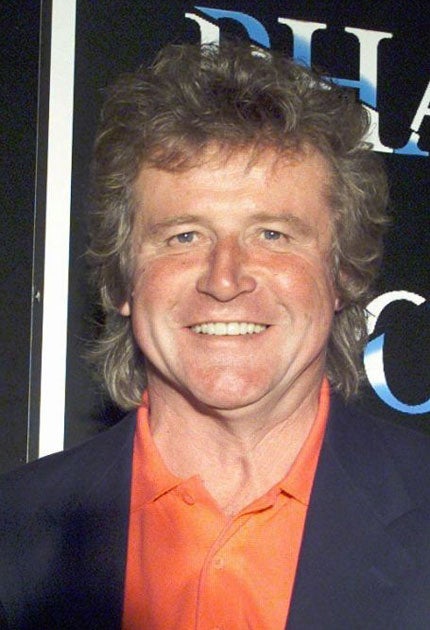Peter Hofmann: Tenor who specialised in Wagner and enjoyed a parallel career as a rock singer

Your support helps us to tell the story
From reproductive rights to climate change to Big Tech, The Independent is on the ground when the story is developing. Whether it's investigating the financials of Elon Musk's pro-Trump PAC or producing our latest documentary, 'The A Word', which shines a light on the American women fighting for reproductive rights, we know how important it is to parse out the facts from the messaging.
At such a critical moment in US history, we need reporters on the ground. Your donation allows us to keep sending journalists to speak to both sides of the story.
The Independent is trusted by Americans across the entire political spectrum. And unlike many other quality news outlets, we choose not to lock Americans out of our reporting and analysis with paywalls. We believe quality journalism should be available to everyone, paid for by those who can afford it.
Your support makes all the difference.The German tenor Peter Hofmann built an international, 25-year career on three Wagner operas.
Tall, slim and extremely good-looking, with a beautiful – if rather light for Wagner – voice, a fine stage presence and considerable acting ability, he sang those three roles all over Europe and the US. He did of course have some other roles in his repertory, but sang none of them with the frequency that he sang Siegmund in Die Walküre or the protagonists of Lohengrin and Parsifal. He was also a very successful rock singer, continuing to give concerts throughout his operatic career.
Hofmann was born in 1944 in Marienbad, Germany (now Mariánské Láznê in the Czech Republic). As a young man he was a fine athlete, achieving distinction in the decathlon. During military service as a paratrooper his talent for rock singing was discovered; later he studied at the Karlsruhe conservatory with Emmy Seiberlich.
He made his debut in 1972 at Lübeck, singing Tamino in Mozart's Die Zauberflöte. In 1974 he moved to Wuppertal and sang the first of his three iconic roles, Siegmund, which was so successful he had to repeat it the following year in Wiesbaden, Rouen and Toulouse. Back in Wuppertal he took part in a new opera, Giselher Klebe's Ein wahrer Held, premiered at Cassel earlier in 1975; this was an adaptation of Synge's The Playboy of the Western World and Hofmann sang Christy Mahon, the non-hero. He also sang Max in Weber's Der Freischütz.
Hofmann sang his second iconic role, Parsifal, in 1976 at Stuttgart and then Munich. The same year Siegmund was his debut role in Bayreuth, the Paris Opéra and at Covent Garden. At this point in his career the tenor's attraction was irresistible; despite some lack of weight in the voice his Siegmund was magnificent, especially in the more lyrical music, such as the long scene with Sieglinde in the first act. He returned to Covent Garden as Max in 1978, in particularly good voice, but needing a double to climb down into the Wolf's Glen as he had had a bad accident the previous summer. Meanwhile he had made his US debut at San Francisco as Siegmund. Because of the accident he did not sing at Bayreuth in 1977, but returned in 1978 as Parsifal, which he sang at Covent Garden the following year.
Hofmann's Parsifal was even better than his Siegmund. He seemed more comfortable vocally in the role, while dramatically it also suited him very well. He sang it at the Salzburg Easter Festival in 1980 to great acclaim.
By now the third iconic role, Lohengrin, was in his repertory. He sang it in Vienna in 1978 and at Bayreuth in 1979. That year he also acquired three other new roles: Bacchus in Richard Strauss' Ariadne auf Naxos at Hamburg; Loge in Wagner's Das Rheingold at Strasbourg; and Florestan in a concert performance of Beethoven's Fidelio at Carnegie Hall, his New York debut. He first appeared at the Metropolitan Opera in 1980 as Lohengrin. During the next three seasons he sang the Swan Knight at La Scala, Milan, Barcelona, the Paris Opéra, San Francisco, Venice and Hamburg. He did not sing Lohengrin in London, but gave an apparently very fine performance with the Royal Opera in Manchester in 1981.
Hofmann took the part of Ludwig Schnorr von Carolsfeld, the first tenor to sing Tristan, in Tony Palmer's TV film Wagner, with Richard Burton in the title role. The film was shown in 1983 but Hofmann did not sing Tristan on stage at Bayreuth until 1986, repeating it the following year. It was too heavy a role for him at this stage in his career. In 1988 he sang Walther von Stolzing in Die Meistersinger von Nürnberg at Bayreuth, as well as Siegmund and Parsifal. After Lohengrin at the Met in 1986, he gave up that role, but continued with Parsifal at Bonn, Venice and Barcelona, as well as Siegmund in Berlin, Turin, Genoa and, for the last time in 1989, at Bayreuth.
From 1990 onwards he appeared 300 times as the protagonist of Andrew Lloyd Webber's The Phantom of the Opera in Hamburg. He also continued his rock tours, but had to give up performing in 1999 because of advancing Parkinson's Disease.
Peter Hofmann, singer: born Marienbad, Germany 12 August 1944; twice married (three children); died Wunsiedel, Bavaria 30 November 2010.
Join our commenting forum
Join thought-provoking conversations, follow other Independent readers and see their replies
Comments